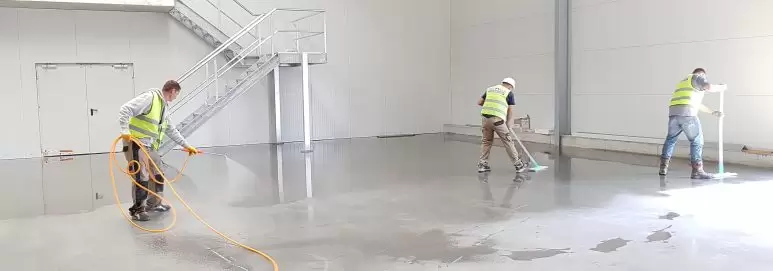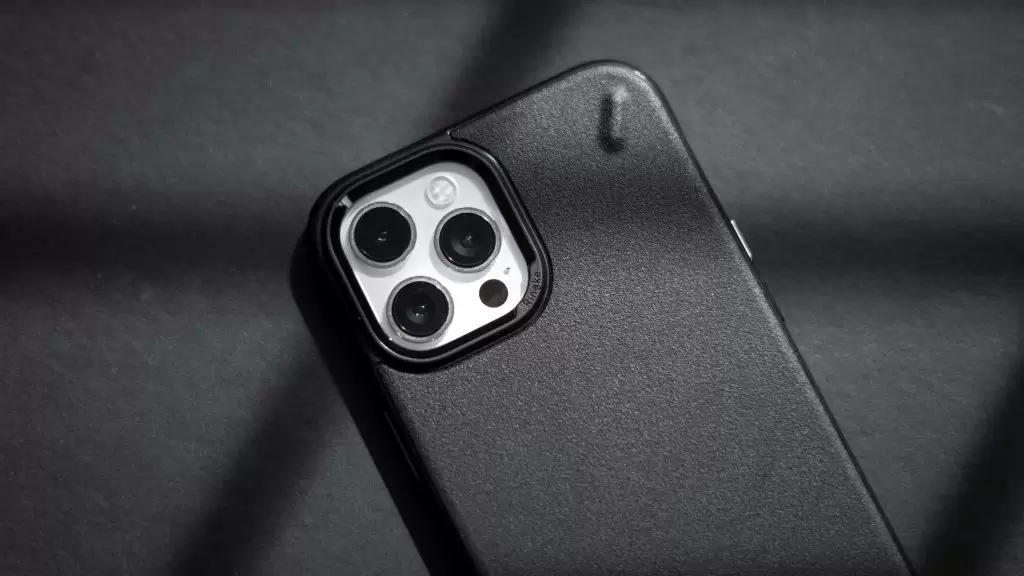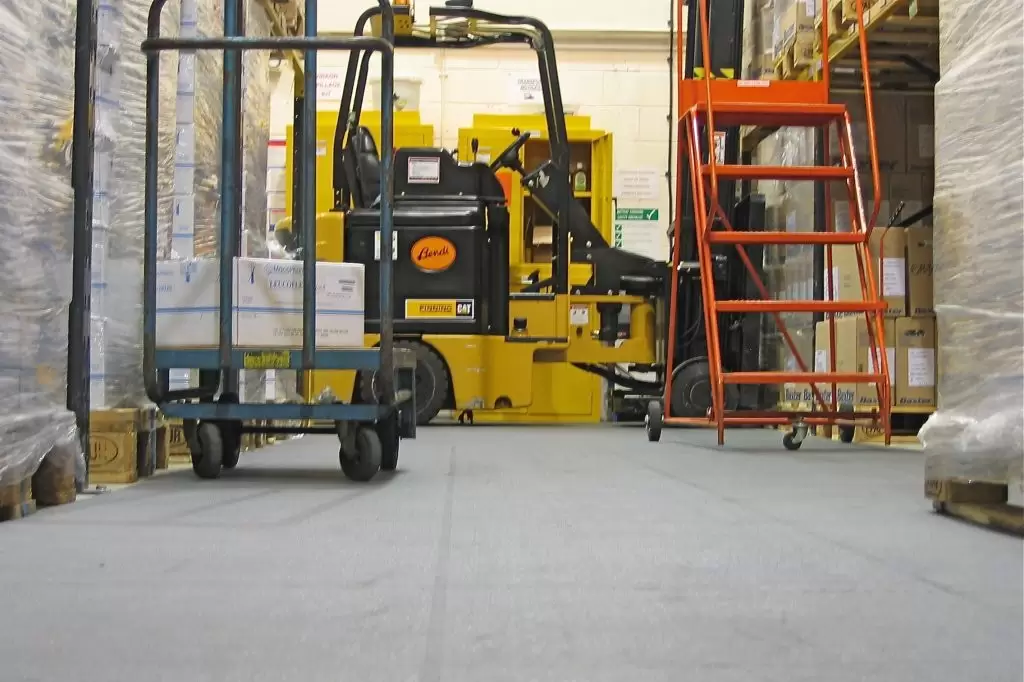
Don’t Repair Your Concrete Floor Until You Read This
Concrete has always been the go-to flooring solution for commercial environments such as manufacturing, warehouses, or workshops. However, the nature of repeated heavy footfall, vehicle movement, and lifting and dropping of heavy items will inevitably take its toll.
Over time concrete will start to show wear and tear.
There’s nothing new in that.
The presence of cracks, uneven surfaces and the build-up of damp can become all too familiar signals that your concrete floor is starting to become worn-out. Its original smooth texture becomes pitted and uneven, making it more difficult to keep clean. And it should be setting off alarm bells for the safety and wellbeing of employees and visitors alike.
This next stage (responding to a wearing concrete floor) is where traditional remedies are often viewed as the only choices. But with the introduction of floor coverings like our interlocking floor tiles as a solution to worn concrete floors in commercial premises, is your business missing a trick? (Not to mention inadvertently causing downtime costs to be unnecessarily higher than they need to be?)
Before You Resurface Your Concrete Floor…
Resurfacing your concrete flooring, albeit costly, sounds like the best route for many businesses. Guaranteed to make good the surface area, reduce the risk of accidents and improve the aesthetics. Yet, on the flip side the implications shouldn’t be underestimated. To name but a few…
- How long will it take to dry?
- How long before we can restart production?
- How much will downtime cost the business?
- Will we lose customers and damage our reputation?
- Can we afford to resurface the floor?
- When’s a good time?
Additionally, those taking a more mid-to-longer term view should be asking how long will this flooring last before the pits start to appear again? When will those unwelcome cracks and surface damage show themselves again? How long before you’re back to the budget spreadsheet to see if it’s possible to repair or resurface the floor again?
What Other Options Are There?
Replacing a concrete floor is an expensive solution compared to other options. And whilst there are quick solutions available like patching over areas with concrete filler and sealant products to restrengthen the floor, they are not necessarily practical in busier environments. For many, the development of tiny cracks in the surface, known as ‘crazing’ means only one thing – paint!
Solutions like this, designed to halt damage and to reduce further spread of issues, are popular. They reduce the cost of repair at the time, they speed up the process, and they cover up the problem. For now. But it will wear out.
The paint will peel, areas will become unsightly and the concretes apparent mission to cause headaches for business owners continues. But the concept of tackling the problem rather than a fully blown new floor installation holds plenty of merit.
Why not cover the floor with something that doesn’t make the problem worse? Ecotile’s Interlocking PVC tiles are designed to protect the floor, prevent any further damage, and last for 20+ years, so you won’t need to worry about the concrete underneath at all!
What Smart Phone Covers and Industrial Floor Coverings Have in Common
Let’s consider repair vs protect. Just as you have the choice when buying the latest smartphone. The hot must-have phone is an expensive outlay, but it is hardwearing and has tough properties (so the manufacturers or shop assistants tell you). But by adding a cover to your phone, you’ll keep it in much better condition. It will add an extra layer of protection that you otherwise wouldn’t have. It ensures that any knocks and wear are taken out on the cover, not the phone. No need for a new one and no need to repair it, you let the cover take the hit. It’s quick to install and will protect it for a long time.
Essentially that’s the premise of floor coverings. Overlaid onto concrete floors, to protect the base layer and the expensive to replace concrete. (Albeit industrial floor coverings came before smart phones were even conceived, but the analogy still rings true).
Different Types of Floor Coverings
For those businesses already savvy to installing floor coverings in their industrial premises to protect their original floor, what options do they have in their armoury? Technically paint and epoxy resin are floor coverings, so should be considered, along with Ecotile (the increasingly popular industrial floor tile).
Epoxy resin can be visually impactful, with different colour options available, as well as being robust for heavy traffic environments. However, there is a great deal of preparation required including grinding the existing floor down and ensuring it’s completely dry and empty (even more production downtime).
There onwards it takes a few days for the floor to cure, but in older buildings, thick layers can sometimes take up to 8 weeks to dry. Another major drawback to installing epoxy resin flooring is that unevenness or cracks in substrates can result in ripples appearing that are not simple to rectify and require treatment. In cases where the floor does eventually need to be redone altogether, it can’t be recycled and would leave a unnecessary footprint on the environment.
Why Interlocking PVC Floor Tiles Stand Out
Many will be familiar with the concept of individual mats placed at points where employees, often in assembly or packing roles, spend lengthy periods of time standing to undertake their work. These mats offer more comfort than concrete, reducing fatigue and ailments associated with standing on hard surfaces repeatedly. Our interlocking floor tiles take this benefit many steps further. They’re designed to be used throughout a workspace, not just at certain touch points. And they do more than just reduce fatigue.
They act as the smartphone cover, protecting the original floor of the premises.
With a thickness of just 7mm, Ecotile floor tiles are able to withstand forklift truck traffic, taking the brunt of the weight and keeping the concrete in its original condition underneath. (10mm tiles withstand aircraft and HGV traffic for the more heavy-duty industrial uses!).
But the real benefit, as we looked at earlier, is the savings on cost. Installed without adhesive in many commercial situations, interlocking floor tiles are extremely quick to install. The downtime a business experiences is the bare minimum. No drying time, no worrying about breaking supply to your customers. The tiles can be laid in sections, so in many instances operations can continue around the installation, certainly a benefit vs having to totally empty a whole building to relay a concrete floor.
In terms of prep, patching any deeply pitted concrete would be necessary to ensure a fairly level floor, but in comparison to the preparation and installation times of the other solutions we considered previously, a minimum of effort.
With tiles available in a multitude of colours, it’s easy to section off areas, colour code work zones, mark out safe pedestrian routes, or add safety messages to tiles. For any customer facing areas, tiles can be printed with welcome messages or brand logo’s, ensuring first impressions are positive ones. Even at ground level.
Treat your floor to a new cover now, and save on time-consuming and expensive repairs later
So, before getting quotes to repair or resurface your concrete floor, look at how other businesses are expanding their choices. Check how effective installing a protective cover could be for your business, and it could save you time and money on restoring damaged concrete.
If you want to learn more about the benefits of using interlocking flooring to protect and enhance your premises, download our brochure, or get in touch with our expert team by emailing [email protected] or call us on 01582 788232 (Monday-Friday, 9am-5pm).

David Bryant-Pugh is sales and marketing manager of Ecotile Flooring. A Member of the Chartered Institute of Marketing (MCIM), David divides his time between creating strategy and tactics for the modular flooring business, and meeting customers to better understand their needs and specific marketplace. Operating across multiple industry sectors (every business has a floor, right!) David’s experience ranges from manufacturing to retail, and everything in between.
Prior to Ecotile, David managed the marketing team at Argos for Business. He previously built a wealth of experience in the foodservice and construction industries as marketing lead. You can find David on LinkedIn



